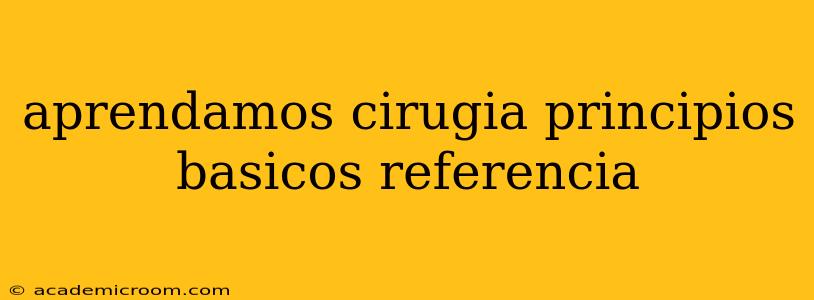Aprendamos Cirugía: Principios Básicos y Referencias Clave
Learning surgery requires a multifaceted approach, combining theoretical knowledge with practical skills and continuous learning. This guide provides a foundational understanding of essential surgical principles and suggests key resources for further exploration. We'll cover crucial aspects, answering common questions surgeons-in-training often have.
¿Cuáles son los principios básicos de la cirugía?
The fundamental principles of surgery revolve around several key concepts: asepsia, hemostasia, anatomía, instrumentalización, and suturas.
-
Asepsia: Maintaining a sterile field is paramount to prevent infection. This includes meticulous handwashing, proper gowning and gloving techniques, and the use of sterile instruments and drapes. Any breach in aseptic technique can lead to serious complications.
-
Hemostasia: Controlling bleeding is crucial during surgery. Techniques range from simple direct pressure to the use of advanced electrocautery, surgical clips, and ligatures. Failure to achieve adequate hemostasis can lead to significant blood loss and potentially life-threatening situations.
-
Anatomía: A thorough understanding of human anatomy is non-negotiable. Surgeons must possess precise knowledge of anatomical structures to avoid damaging vital organs or nerves during procedures. Detailed anatomical atlases and regular review are vital.
-
Instrumentalización: Familiarity with a wide range of surgical instruments and their appropriate use is essential. Each instrument has a specific function, and proper handling ensures efficiency and safety. Practical training and hands-on experience are crucial here.
-
Suturas: The proper selection and placement of sutures are critical for wound closure and tissue approximation. Different suture materials have varying properties, and the choice depends on the tissue type and the surgical goal. Mastering suture techniques takes time and practice.
¿Qué libros son buenas referencias para principiantes en cirugía?
Numerous excellent textbooks cater to surgical novices. Some popular choices include:
- Schwartz's Principles of Surgery: A comprehensive and widely respected textbook covering a vast range of surgical topics. It's known for its detailed explanations and high-quality illustrations.
- Sabiston Textbook of Surgery: Another classic text, renowned for its clear writing style and emphasis on clinical application. It provides a strong foundation in surgical principles.
- Bailey & Love's Short Practice of Surgery: A more concise option, ideal for a quick overview or as a supplementary text. It focuses on the essential aspects of surgical practice.
Choosing a textbook depends on individual learning styles and preferences. It's often beneficial to consult multiple sources to gain a well-rounded understanding.
¿Cómo puedo aprender cirugía de forma efectiva?
Effective learning in surgery combines theoretical study with extensive practical training. Here's a structured approach:
- Solid foundation in basic sciences: A strong grasp of anatomy, physiology, and pathology is critical.
- Structured curriculum: Follow a well-defined curriculum that progresses from basic principles to more complex procedures.
- Hands-on training: Participate in surgical simulations, observe experienced surgeons, and gradually take on more responsibilities under supervision.
- Continuous learning: Stay updated with the latest advancements through journals, conferences, and professional development courses.
- Mentorship: Seek guidance and feedback from experienced surgeons. A strong mentor can provide invaluable support and advice.
¿Existen recursos online para aprender sobre cirugía?
While online resources can supplement learning, they should never replace formal training and supervision. Reputable online medical journals and educational platforms can offer valuable information, but always verify the credibility of the source. Consider using online resources to reinforce concepts learned in formal training, not as a primary learning method.
¿Qué especialidades quirúrgicas existen?
Surgery encompasses a wide range of specialties, including (but not limited to):
- Cardiothoracic surgery: Operations on the heart and lungs.
- Neurosurgery: Surgery of the brain, spine, and nervous system.
- Orthopedic surgery: Surgery of the musculoskeletal system.
- General surgery: A broad field covering many abdominal and other procedures.
- Vascular surgery: Surgery of the blood vessels.
- Plastic surgery: Reconstructive and cosmetic surgery.
- Urology: Surgery of the urinary tract and male reproductive system.
- Otolaryngology: Surgery of the ear, nose, and throat.
Learning surgery is a long and demanding journey, requiring dedication, perseverance, and a commitment to continuous learning. This guide provides a starting point; further exploration of the recommended resources will deepen your understanding and pave the way for a successful surgical career. Remember that this information is for educational purposes only and should not substitute professional medical advice.
